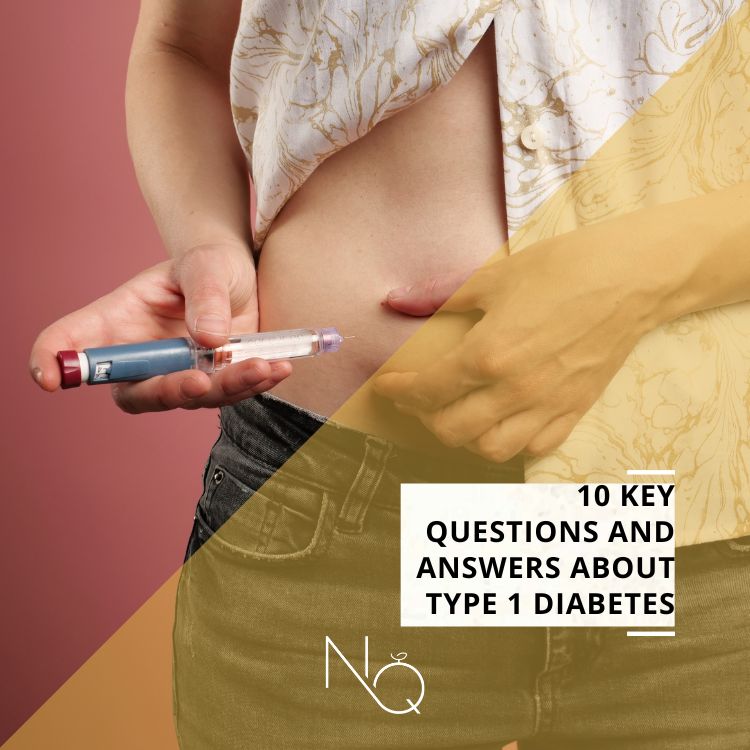Type 1 Diabetes Mellitus is an autoimmune disease that affects many people. This article answers 10 frequently asked questions about type 1 diabetes and discusses the role that diet plays in managing it.
1. What is type 1 diabetes?
Type 1 diabetes is a condition in which the body does not produce enough insulin to regulate blood sugar levels. It is sometimes referred to as "insulin-dependent" or "juvenile" diabetes because it typically develops at a younger age, and external insulin is required.
2. What happens inside the body of someone who has type 1 diabetes?
The food we consume is broken down during digestion, with carbohydrates being one of the essential components. Carbohydrates are further broken down into simple sugars, primarily glucose. Glucose enters the bloodstream after leaving the digestive tract and is used by the body's cells for energy. Insulin, a hormone produced by the pancreas, signals these cells to absorb glucose. In type 1 diabetes, some or all of the insulin-producing cells are destroyed, leaving the individual with insufficient insulin. Consequently, glucose accumulates in the bloodstream instead of entering cells, leading to high blood sugar levels, increased urination, dehydration, and tissue damage. This is a serious condition that requires attention.
3. What are the initial symptoms of type 1 diabetes?
The initial symptoms of type 1 diabetes typically manifest suddenly and severely. The most common signs include:
- Frequent urination (polyuria), which may result in bedwetting in children.
- Excessive thirst (polydipsia).
- Increased appetite, often with unexplained weight loss.
Other possible symptoms include
- Weakness
- Fatigue
- Confusion
- Sickness
- Vomiting
4. Is type 1 diabetes contagious?
No, type 1 diabetes is not contagious. It is an autoimmune disease in which the body's own immune system attacks the insulin-producing cells in the pancreas. The exact cause is unknown, but some individuals may have a predisposition to the condition. Type 1 diabetes is a chronic disease and is most commonly diagnosed between the ages of 10 and 16, affecting both men and women equally.
5. If I consume a lot of sugar, will I develop type 1 diabetes?
No, consuming sugary foods does not lead to the development of type 1 diabetes. However, a balanced diet is crucial for overall health and may help prevent various diseases, including type 2 diabetes.
6. What is chronic inflammation in type 1 diabetes mellitus?
In type 1 diabetes, the body's immune system mistakenly attacks its own tissues, leading to chronic inflammation in affected areas. While inflammation can be beneficial in healing external wounds, in autoimmune diseases like type 1 diabetes, it can worsen and prolong the damage. Chronic low-grade inflammation in type 1 diabetes is associated with conditions such as cardiovascular disease, cancer, and other health issues.
7. What are the chronic symptoms of type 1 diabetes?
Some chronic symptoms of type 1 diabetes (T1DM) include:
- Eye damage (retinopathy)
- Nerve damage (neuropathy)
- Foot problems
- Kidney problems (nephropathy)
- Cardiovascular and arterial diseases
- Hypoglycemia (low blood sugar)
8. How is type 1 diabetes diagnosed?
Type 1 diabetes is diagnosed through a combination of factors, including medical history, symptoms, and laboratory tests. The following criteria are used for diagnosis:
- Fasting blood glucose level exceeding 126 mg/dL after eight hours of fasting.
- Oral glucose tolerance test (OGTT) with a blood sugar level of 200 mg/dL or higher two hours after consuming 75 grams of glucose.
- Random blood glucose test showing a level of 200 mg/dL or higher along with diabetes symptoms.
- Measurement of glycosylated hemoglobin HbA1c in the blood, indicating the average glucose level over the previous 2-3 months, with a value of 6.5% or higher.
9. Do people with type 1 diabetes need to follow a specific diet?
Yes, individuals with type 1 diabetes should follow a specific diet and engage in regular exercise. A balanced diet is essential to maintain healthy blood sugar levels, prevent diabetes complications, and promote overall well-being. Carbohydrates are not off-limits, and the diet includes all food groups with an emphasis on nutritious foods like healthy fats, complex carbohydrates, and lean protein sources. Meals and exercise should be coordinated with insulin intake in terms of timing and quantity.
10. What does a dietitian visit entail for someone with type 1 diabetes?
For individuals diagnosed with type 1 diabetes, regular visits to a dietitian are essential for effective disease management and a good quality of life. The frequency of these visits may vary depending on individual needs, goals, and education level. The initial appointment typically involves a physical assessment, medical history review, evaluation of laboratory test results, information about medication, and the recording of dietary habits. Subsequently, a personalized nutrition plan is developed to align with the individual's goals. Nutritional therapy provides education on food choices, carbohydrate counting, meal planning, exercise management, and addressing other health goals or conditions that can be managed through nutrition. Keeping a food diary and monitoring blood sugar levels help individuals stay within the treatment goals established by their healthcare provider. The aim is for individuals to become empowered in managing their own nutrition and to possess a thorough understanding of their condition, enabling them to make informed dietary choices that complement their insulin regimen and medication.
These are 10 key questions and answers about type 1 diabetes, offering insights into the condition and how individuals can effectively manage it to lead a normal, healthy life. Education and self-management are crucial for people with type 1 diabetes to maintain their well-being and carry out their daily activities.




